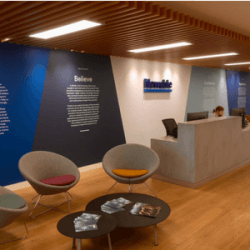October 29, 2018
The death of desks, the truth about smart cities and a long list of things architects should know
 You can’t judge an international marketplace by wandering around an exhibition of its products for a day or two. This is a simple fact overlooked by a new piece in Dezeen which declares that desks are finished. This notion is based on a trip to the Orgatec furniture fair in Cologne. Our own review of the show will appear tomorrow, with the hysteria dialled down to a dull roar and with some added facts about what organisations actually buy most from office furniture companies (spoiler: desks and chairs) compared to what makes the sector more interesting.
You can’t judge an international marketplace by wandering around an exhibition of its products for a day or two. This is a simple fact overlooked by a new piece in Dezeen which declares that desks are finished. This notion is based on a trip to the Orgatec furniture fair in Cologne. Our own review of the show will appear tomorrow, with the hysteria dialled down to a dull roar and with some added facts about what organisations actually buy most from office furniture companies (spoiler: desks and chairs) compared to what makes the sector more interesting.




































